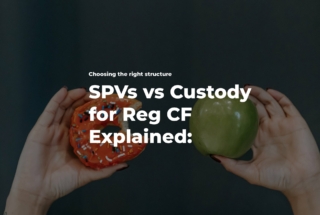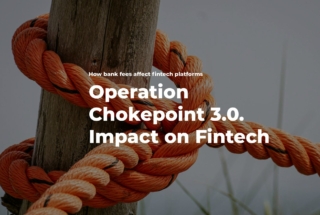Crowdfunding Broker-dealer vs Funding Portal: Which One to Start
No time to read? Let AI give you a quick summary of this article.
Both broker-dealer firms and crowdfunding online portals perform the same function: they act as an intermediary through which one can buy and sell securities. However, they are crucially different in several ways:
- A broker-dealer can be both an individual and a firm, while a funding portal is an app or an online platform.
- A broker-dealer can act as a brokerage agent, trading for a client for a commission, or a dealer, trading for themselves as the center of the transaction. In contrast, a crowdfunding platform is like an online marketplace where fundraisers can connect with investors to fund their projects independently.
- Unlike broker-dealers, crowdfunding portals have a number of limitations to the kinds of activities and services they can perform.
Because of these differences, the registration process and the regulations that govern the activities vary for the two types of intermediary.
| Broker-dealer | Funding portal | |
| Regulatory authority | SEC and FINRA | SEC and FINRA |
| Cost of registration | $7,500 – $55,000 depending on the size of the applicant | over $3,200 + membership fees |
| How long does it take to register? | 45 days from the day the form is received by SEC | 30 days from the day the form is received by SEC |
| Total number of firms in the US | 3,500+1 | 652 |
A whole separate niche of this business is crowdfunding REIT broker-dealers – real estate investment trusts. The main difference of such firms is in their characteristics:
- A minimum of 75% of their assets must lie within real estate
- They have at least 100 owners
- Interests are transferable
- Up to 50% of total interests can be held by as few as five individuals
The main lucrative point of operating as a REIT is that the business is exempt from tax if it distributes 90% of its income to the investors.
What you will learn in this post:
Advantages and disadvantages of crowdfunding Broker-dealers and Funding Portals
Disadvantages of being registered as a crowdfunding portal:
- Limited services and activities. According to SEC3, crowdfunding portals aren’t allowed the following activities:
- Offering investment advice or recommendations;
- Soliciting purchases, sales or offers to buy the securities displayed on its platform;
- Compensating employees, agents, or other persons for such solicitation or based on the sale of securities displayed or referenced on its platform; or
- Holding, managing, possessing, or handling investor funds or securities.
If you intend to do any of these, you are better off registering as a broker-dealer.
Advantages of being registered as a crowdfunding portal:
- Affordability. Because online portals don’t offer as many services as a broker-dealer company does, the fees are significantly lower, making them more affordable for investors and fundraisers alike.
- Dealing with an unlimited pool of investors and fundraising projects allows crowdfunding portals to attract a far larger capital as opposed to broker-dealer firms.
Since broker-dealers deal with a different range of services and application processes than online portals, they come across their own difficulties and benefits.
Disadvantages of being registered as a broker-dealer:
- Expenses. The registration process itself, plus the membership and maintenance fees for a broker-dealer are notoriously large – especially if you hold considerable capital.
- Competition. There are thousands of broker-dealers in the US – making a name in such a competitive environment is a tough task.
- To register, you must comply with a range of strict crowdfunding broker-dealer requirements, such as minimum capital and essential participation in a number of programs and activities.
Advantages of being registered as a broker-dealer:
- Wide range of capabilities. Broker-dealers are capable of doing anything that crowdfunding portals are not permitted to do.
How to register a Broker-dealer vs Funding portal
The registration steps for crowdfunding portals and broker-dealers vary greatly.
To register as an online portal:
- Reserve a unique name with FINRA
- Fill out a form ID application via the EDGAR database
- Assign a Super Account Administrator
- Submit your fingerprints
- Pay the fees
- Receive the credentials
To register as a brokerage agent:
- You must have a starting capital of at least $50,000 to $100,000
- Fill out a Form FD and submit to SEC for registration
- Apply for a membership with SRO (e.g. FINRA) and SIPC. Bear in mind that registering with an SRO takes extra time on top of the time required for a SEC registration
- Make sure your business complies with the local state requirements – you can get information for each specific state at the NASAA website4
- If you have any partners or persons that work for your company, you need to ensure that they satisfy any qualification requirements
You must be registered as a broker-dealer in each state where you intend to operate. Additionally, when you have successfully completed the registration process, you must participate in your SRO’s examinations – for FINRA, you can find out more5 on their website. There are also two essential programs that need to be maintained – the money laundering program and lost and stolen securities program.
To learn more about the process of registration as an agent, check out the guide 6published by SEC.
Crowdfunding software for Broker-dealers and Funding portals
When choosing between registering as a crowdfunding broker-dealer or an online portal, there is really no good or bad – depending on your objectives, you will want to go for one or the other option. If you are looking to provide investment advice, you may want to register as a broker-dealer. A crowdfunding platform is a bit easier and cheaper to create and maintain, but has limited services options.
If you’ve placed your bet and now thinking about your software choices for either an online portal or a broker-dealer website, we can support your decision-making process. LenderKit is a white-label software provider that can help you create a completely customized software that fully complies with the SEC requirements. We provide a range of options that will allow you to operate as a broker-dealer and crowdfunding platform alike based on your license.
Get in touch with us for more information or advice to build your crowdfunding platform in the USA.
Article sources:



